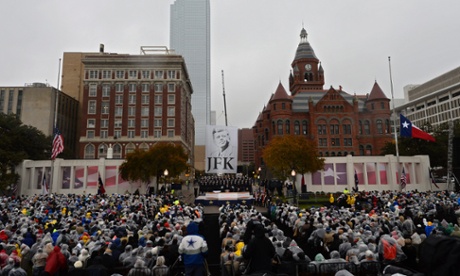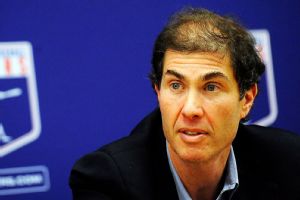Who better to reveal the secrets of
Doctor Who than an actual doctor? Meet
Doctor Who expert Dr. Piers D. Britton. He might sound a
Doctor Who expert we just totally made up, but he’s a real person who wrote a book on
Doctor Who titled
TARDISbound and teaches a class on the iconic show at the University of Redlands in California (if you’re a hardcore
Doctor Who
fan who had to sit through dull college electives, you’re probably
feeling a surge of envy for Redlands students right now). With
Doctor Who‘s
eagerly awaited 50th Anniversary special “Day of the Doctor” set to be
unveiled tomorrow on BBC America (2:50 p.m. ET), Dr. Britton reveals 15
strange and fascinating
Doctor Who facts that you probably did not know.

–
Doctor Who showrunner Steven Moffat was initially opposed to Matt Smith’s wish to wear his now-iconic bow tie.
– All the Silurians seen since 2010′s “The Hungry Earth” are played by the same three actors.
– Paul McGann is technically the longest-serving Doctor, though he
appeared only once on television in 1996 (until last week!). Tom Baker
is, of course, the longest serving on television, having starred in more
Doctor Who shows than any other actor.
The Impossible Astronaut” (2011) was the first episode filmed in US
in which the actors playing the Doctor and his companions actually
participated in shooting; the earlier “Daleks in Manhattan” featured
footage shot in New York, which was then digitally blended with the
Welsh locations in which David Tennant and Freema Agyeman were shooting.
– The TARDIS has a six-sided control console because it was designed to have six operatives.
– “Rose” (2005) was the first episode ever named for a companion
(though the title of the original pilot episode, 1963′s “An Unearthly
Child,” does refer to the Doctor’s earliest companion, his granddaughter
Susan).
– The TARDIS wheezes and groans during landing because Doctor leaves the brakes on.
– Two of the actors playing the Doctor have married actresses who had
continuing or key roles in the series: Tom Baker was briefly married to
Lalla Ward, who played the Time Lady Romana, in the early 1980s, and
David Tennant is now married to Georgia Moffett, who played the Doctor’s
daughter, Jenny (and is, coincidentally, the real-life daughter of the
Fifth Doctor, Peter Davison).
– Peter Capaldi and Karen Gillan not only both had
Doctor Who
roles before they were cast as, respectively, the Twelfth Doctor and
companion Amy Pond, but actually appeared in the same episode.
– The episodes “Human Nature” and “Blink” (2007) were based on an original
Doctor Who
novel written in 1995 as part of the New Adventures series that picked
up where the classic series left off, and therefore originally featured
the Seventh Doctor, Sylvester McCoy.
– The ancient race of aliens The Weeping Angels were inspired by a
carved figure in a graveyard that Steven Moffat used to see when he went
on family holidays. The graveyard was marked “dangerous,” which is what
attracted Moffat’s interest.
– The TARDIS looks like an old fashioned police lock-up box because
its cloaking device, the chameleon circuit, malfunctioned after his
first visit to 1963 London.
– The Doctor’s sonic screwdriver has gone through multiple forms, and
its functionality has changed a good deal: at times it can do anything
from triggering mines to repairing transmit beacons; at others, it can’t
even open a mortice lock (because it’s too simple). Producer John
Nathan Turner had the sonic written out of the series in the early 1980s
because he felt it made the Doctor’s life too easy; for Russell T.
Davies, on the other hand, it was important that, whatever challenges he
faced, the Doctor wouldn’t be limited by a locked door. In “The Day of
the Doctor” we know for sure we’re going to see two sonics — Matt
Smith’s and David Tennant’s, but from publicity photographs it looks
very much as though the “War Doctor,” played by John Hurt, will be
rocking something much more like the versions used by Tom Baker and Jon
Pertwee. Only time will tell …


 ear.
ear.















